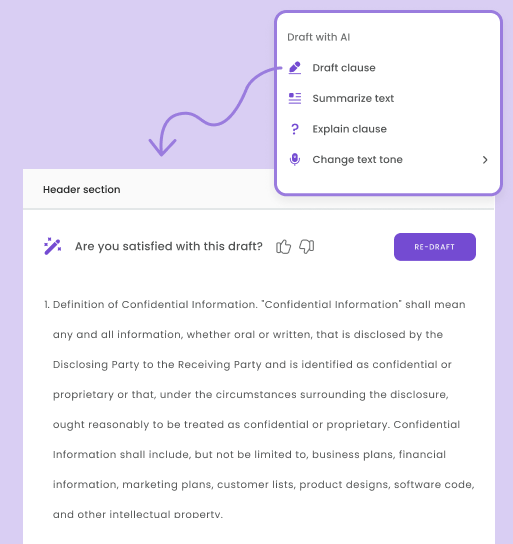Contract administration can be described as the monitoring or supervision of the contract lifecycle and the steps involved in achieving your business goals.
There’s an emphasis on the operational activities to draft and then carry out the contract.
Contract management focuses on adhering to the terms of the contract and that contractual obligations are met. They’re often used interchangeably but they’re different concepts.
This guide looks at contract administration, its key components, the roles of a contract administrator, and a few challenges you may experience while administering contracts.
Key Components of Contract Administration
Contract Creation and Drafting
The foundation of effective contract administration lies in meticulous contract creation and drafting.
This phase involves defining the terms, conditions, responsibilities, and deliverables associated with the agreement.
The contract must be comprehensive, addressing potential contingencies and incorporating specific clauses to protect the interests of all parties.
Legal expertise is crucial during this stage to ensure the contract is legally sound and enforceable, minimizing ambiguities that could lead to disputes.
Negotiation and Approval
Once a draft is prepared, the next step is negotiation and approval. This process requires open communication and collaboration between the involved parties to reach a mutually beneficial agreement.
Negotiations often involve adjusting terms, pricing, timelines, and other critical elements to align with each party’s objectives.
Successful negotiation hinges on understanding the needs and constraints of the other party, aiming for a win-win situation.
Upon reaching an agreement, the contract must go through an approval process, which may involve internal review by legal, financial, and executive teams to ensure alignment with organizational policies and strategic goals.
Implementation and Monitoring
After approval, the contract moves into the implementation and monitoring phase.
This involves executing the agreed-upon terms and actively managing the relationship to ensure compliance and performance.
Effective monitoring requires establishing metrics and benchmarks to measure progress and performance.
Regular reviews and audits should be included to identify and address any issues promptly.
Clear communication channels and reporting mechanisms help maintain transparency and accountability throughout the contract’s lifecycle.
Modification and Change Management
Contracts often need modifications due to changing circumstances, unforeseen events, or evolving business needs.
The modification and change management phase addresses these adjustments systematically. Any changes to the contract must be documented through formal amendments, ensuring all parties agree to the new terms.
A well-defined change management process helps manage these modifications without disrupting the overall objectives of the contract.
This process includes evaluating the impact of changes, obtaining necessary approvals, and updating all relevant documentation.
Compliance and Risk Management
Ensuring compliance with contractual terms and managing associated risks are critical components of contract administration.
This phase involves regular monitoring to ensure all parties adhere to the agreed terms and identifying potential risks that could impact contract performance.
Risk management strategies include proactive measures to mitigate identified risks, such as conducting regular risk assessments, implementing control measures, and developing contingency plans.
Compliance checks help maintain legal and regulatory standards, thereby avoiding penalties and reputational damage.
Renewal and Termination
The final phase in contract administration is renewal and termination. As a contract nears its end, a decision must be made whether to renew or terminate it.
Renewal involves reviewing the contract’s performance, renegotiating terms if necessary, and extending the agreement.
Termination, on the other hand, requires a structured approach to ensure all obligations are fulfilled and any outstanding issues are resolved.
Proper documentation and communication are essential to ensure a smooth transition during termination, whether the contract ends due to completion, mutual agreement, or breach.
The Contract Administration Process
Pre-Award Phase
The contract administration process begins with the pre-award phase, a period where the groundwork for a successful contractual relationship is laid.
This phase involves identifying needs, developing a detailed scope of work, and preparing solicitation documents.
Key activities include defining the project requirements, setting objectives, and determining the evaluation criteria for potential contractors or suppliers.
Request for Proposals (RFPs), Invitations to Bid (ITBs), or Requests for Quotations (RFQs) are issued during this stage to attract suitable candidates.
The pre-award phase also involves pre-qualification of bidders, ensuring they meet the necessary standards and possess the capabilities to fulfill the contract requirements. This thorough preparation helps mitigate risks and sets clear expectations for both parties.
Award Phase
Once the solicitation process concludes, the contract moves into the award phase. This phase involves evaluating the received bids or proposals against the pre-defined criteria to select the most suitable contractor or supplier.
The selection process should be transparent and objective, focusing on factors such as cost, technical capability, experience, and compliance with regulatory requirements.
After identifying the preferred bidder, negotiations may take place to finalize terms and conditions, ensuring mutual agreement on all aspects of the contract.
The formal contract is then awarded and executed, marking the beginning of the legal and binding agreement between the parties.
Ensure that all contractual documents are signed and properly documented during this phase to establish a clear legal framework.
Post-Award Phase
The post-award phase is where the focus shifts to contract implementation, performance monitoring, and relationship management.
This phase involves executing the contract terms, monitoring compliance, and managing performance to ensure deliverables are met according to the agreed schedule and quality standards.
Regular communication between the parties is crucial to address any issues promptly and facilitate smooth collaboration.
Contract administration tasks such as managing amendments, handling disputes, and ensuring timely payments are central to this phase.
Additionally, post-award activities include conducting periodic reviews and audits to ensure ongoing compliance and performance.
As the contract approaches its end, the post-award phase also involves evaluating whether to renew, extend, or terminate the agreement, ensuring a structured and efficient conclusion to the contract lifecycle.
Roles and Responsibilities in Contract Administration
Contract Administrator
The contract administrator plays a central role in the contract administration process, overseeing the entire lifecycle of the contract from inception to completion.
Their responsibilities include drafting and reviewing contract terms, managing negotiations, and ensuring all contractual obligations are met.
They are tasked with maintaining comprehensive records, monitoring contract performance, and handling any amendments or modifications.
Contract administrators also facilitate communication between all parties involved, address disputes, and ensure compliance with legal and regulatory requirements.
Their role is pivotal in ensuring that the contract delivers its intended value while mitigating risks and resolving issues promptly.
Project Managers
Project managers are crucial in the implementation phase of contract administration, ensuring that the contractual terms align with project goals and timelines.
They’re responsible for overseeing the day-to-day execution of the project, coordinating with various teams, and ensuring that deliverables are met according to the contract specifications.
Project managers monitor performance metrics and KPIs, manage resources, and address any operational challenges that arise.
They serve as a liaison between the contract administrator and the project team, providing regular updates on progress and any potential issues.
Their role ensures that the project stays on track and that any deviations from the contract are promptly addressed.
Legal and Compliance Teams
Legal and compliance teams play a role in supporting contract administration by ensuring all contractual terms comply with relevant laws and regulations.
The legal team is involved in the drafting and review stages, providing expert advice to mitigate legal risks and ensure enforceability.
They assist in negotiations, particularly in clarifying the legal implications of contract terms and conditions.
Compliance teams make sure everyone adheres to regulatory requirements and internal policies throughout the contract’s duration.
They conduct regular audits and compliance checks, identify potential risks, and develop strategies to address them.
Their involvement helps maintain the integrity and legality of the contract, thereby protecting you from legal liabilities and ensuring ethical standards are upheld.
Challenges in Contract Administration
Common Issues
One prevalent challenge is unclear or ambiguous contract terms, which can lead to misunderstandings and disputes between parties.
Inadequate contract documentation and poor record-keeping practices can also create difficulties in tracking obligations, amendments, and compliance.
Delays in approvals or execution can stall projects and increase costs. Furthermore, inconsistent monitoring of performance metrics can result in unmet deliverables and unsatisfactory outcomes.
Addressing these issues requires a robust and proactive approach to contract drafting, documentation, and performance management.
Risk Management
Effective risk management is a critical yet challenging aspect of contract administration. Contracts often involve various risks, including financial, operational, legal, and reputational risks.
Identifying and mitigating these risks requires comprehensive risk assessments during the contract drafting and negotiation stages.
However, unexpected changes in market conditions, regulatory environments, or project scope can introduce new risks during the contract lifecycle.
Managing these risks demands continuous monitoring and the ability to adapt strategies swiftly. Contract administrators must develop contingency plans, maintain flexibility in contract terms, and ensure that all parties are aware of and prepared for potential risks.
This dynamic approach helps minimize adverse impacts and ensures smoother contract execution.
Communication and Coordination
Miscommunication or lack of communication can lead to misaligned expectations, overlooked obligations, and delays in contract execution.
Ensuring that all parties—contract managers, project managers, legal and compliance teams, and external stakeholders—are on the same page requires clear and consistent communication channels.
Regular meetings, status updates, and transparent reporting mechanisms are essential to maintain alignment and address issues promptly.
Coordination is also complicated by the diverse interests and priorities of the involved parties, necessitating strong leadership and conflict-resolution skills.
Overcoming these challenges involves fostering a collaborative environment where information flows freely, and everyone works towards common goals.
Best Practices for Effective Contract Administration
Clear and Detailed Contracts
Creating clear and detailed contracts is fundamental to effective contract administration.
Every contract should explicitly define the roles and responsibilities of each party, the scope of work, performance expectations, timelines, and payment terms.
Include precise language to avoid ambiguity with the goal of reducing the risk of misunderstandings and disputes.
Essential clauses such as termination conditions, confidentiality agreements, dispute resolution mechanisms, and force majeure provisions should be meticulously detailed.
Utilizing standardized templates can help ensure consistency and completeness. Engaging legal experts during the drafting phase is crucial to ensure the contract is enforceable and compliant with relevant laws and regulations.
A well-drafted contract serves as a reliable reference point throughout the contract lifecycle, guiding actions and decisions.
Regular Audits and Reviews
Conducting regular audits and reviews is a best practice that ensures ongoing compliance and performance in contract administration.
Scheduled audits help verify that all parties are adhering to the contractual terms and that deliverables are being met according to the agreed standards and timelines.
Reviews should assess performance metrics and KPIs to identify any deviations from expectations. These evaluations provide opportunities to address issues early, adjust strategies, and implement necessary changes.
Regular reviews also facilitate continuous improvement by learning from past experiences and applying those insights to future contracts.
Keeping thorough and up-to-date records of these audits and reviews is essential for accountability and transparency.
Training and Development
Investing in training and development for all personnel involved in contract administration enhances their skills and knowledge, leading to more effective management practices.
Training programs should cover contract law basics, negotiation techniques, risk management strategies, and best practices in documentation and record-keeping.
Providing ongoing education about updates in relevant regulations, industry standards, and technological advancements ensures that the team remains proficient and adaptable.
Practical workshops, seminars, and certification courses can deepen understanding and competence.
Developing a culture of continuous learning within the organization encourages staff to stay current with best practices and emerging trends, ultimately improving the overall quality of contract administration.
Conclusion
Contract administration is an important part of the contract lifecycle. When done properly, it’ll save you money, reduce disputes, and ensure projects get completed on time.
There are many moving pieces which include awarding the contract, understanding the different roles of the administrators, and working with multiple stakeholders.
This guide has given you a detailed overview of what to expect and how to excel with contract administration. It’s up to you to make the most of it.
Let me know what you think in the comments and don’t forget to share.




